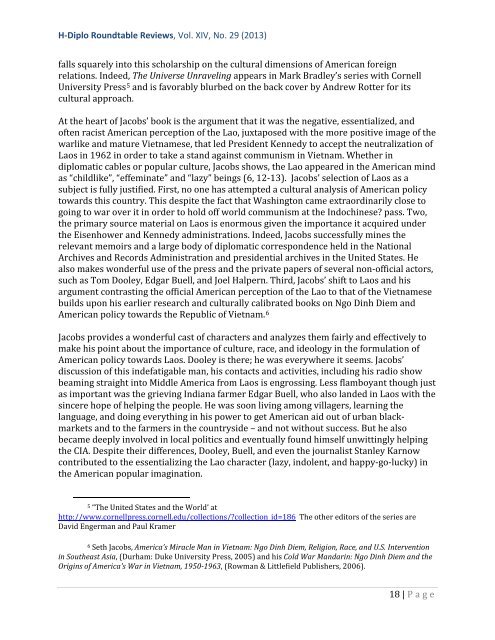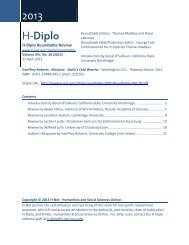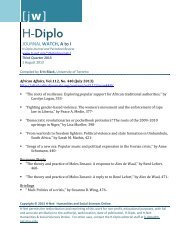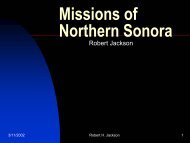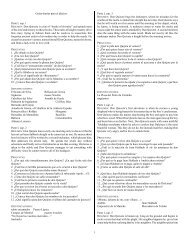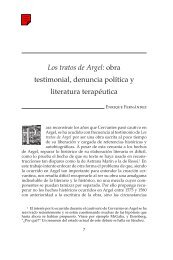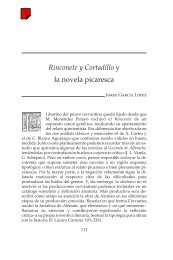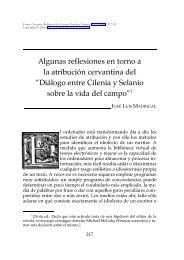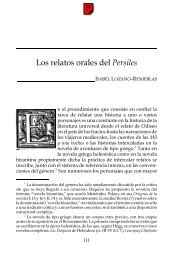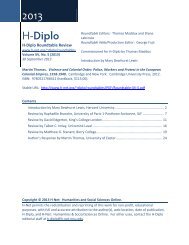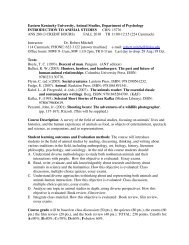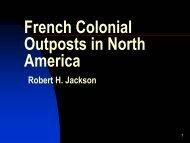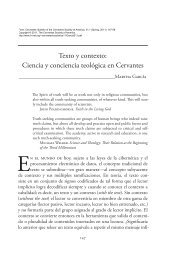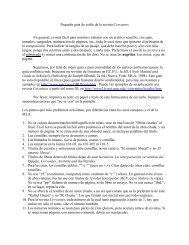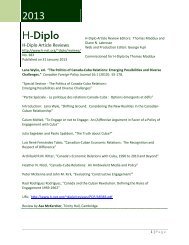H-Diplo Roundtables, Vol. XIV, No. 29 (2013) - H-Net
H-Diplo Roundtables, Vol. XIV, No. 29 (2013) - H-Net
H-Diplo Roundtables, Vol. XIV, No. 29 (2013) - H-Net
You also want an ePaper? Increase the reach of your titles
YUMPU automatically turns print PDFs into web optimized ePapers that Google loves.
H-<strong>Diplo</strong> Roundtable Reviews, <strong>Vol</strong>. <strong>XIV</strong>, <strong>No</strong>. <strong>29</strong> (<strong>2013</strong>)<br />
falls squarely into this scholarship on the cultural dimensions of American foreign<br />
relations. Indeed, The Universe Unraveling appears in Mark Bradley’s series with Cornell<br />
University Press 5 and is favorably blurbed on the back cover by Andrew Rotter for its<br />
cultural approach.<br />
At the heart of Jacobs’ book is the argument that it was the negative, essentialized, and<br />
often racist American perception of the Lao, juxtaposed with the more positive image of the<br />
warlike and mature Vietnamese, that led President Kennedy to accept the neutralization of<br />
Laos in 1962 in order to take a stand against communism in Vietnam. Whether in<br />
diplomatic cables or popular culture, Jacobs shows, the Lao appeared in the American mind<br />
as “childlike”, “effeminate” and “lazy” beings (6, 12-13). Jacobs’ selection of Laos as a<br />
subject is fully justified. First, no one has attempted a cultural analysis of American policy<br />
towards this country. This despite the fact that Washington came extraordinarily close to<br />
going to war over it in order to hold off world communism at the Indochinese? pass. Two,<br />
the primary source material on Laos is enormous given the importance it acquired under<br />
the Eisenhower and Kennedy administrations. Indeed, Jacobs successfully mines the<br />
relevant memoirs and a large body of diplomatic correspondence held in the National<br />
Archives and Records Administration and presidential archives in the United States. He<br />
also makes wonderful use of the press and the private papers of several non-official actors,<br />
such as Tom Dooley, Edgar Buell, and Joel Halpern. Third, Jacobs’ shift to Laos and his<br />
argument contrasting the official American perception of the Lao to that of the Vietnamese<br />
builds upon his earlier research and culturally calibrated books on Ngo Dinh Diem and<br />
American policy towards the Republic of Vietnam. 6<br />
Jacobs provides a wonderful cast of characters and analyzes them fairly and effectively to<br />
make his point about the importance of culture, race, and ideology in the formulation of<br />
American policy towards Laos. Dooley is there; he was everywhere it seems. Jacobs’<br />
discussion of this indefatigable man, his contacts and activities, including his radio show<br />
beaming straight into Middle America from Laos is engrossing. Less flamboyant though just<br />
as important was the grieving Indiana farmer Edgar Buell, who also landed in Laos with the<br />
sincere hope of helping the people. He was soon living among villagers, learning the<br />
language, and doing everything in his power to get American aid out of urban blackmarkets<br />
and to the farmers in the countryside – and not without success. But he also<br />
became deeply involved in local politics and eventually found himself unwittingly helping<br />
the CIA. Despite their differences, Dooley, Buell, and even the journalist Stanley Karnow<br />
contributed to the essentializing the Lao character (lazy, indolent, and happy-go-lucky) in<br />
the American popular imagination.<br />
5 “The United States and the World’ at<br />
http://www.cornellpress.cornell.edu/collections/?collection_id=186 The other editors of the series are<br />
David Engerman and Paul Kramer<br />
6 Seth Jacobs, America’s Miracle Man in Vietnam: Ngo Dinh Diem, Religion, Race, and U.S. Intervention<br />
in Southeast Asia, (Durham: Duke University Press, 2005) and his Cold War Mandarin: Ngo Dinh Diem and the<br />
Origins of America's War in Vietnam, 1950-1963, (Rowman & Littlefield Publishers, 2006).<br />
18 | P age


